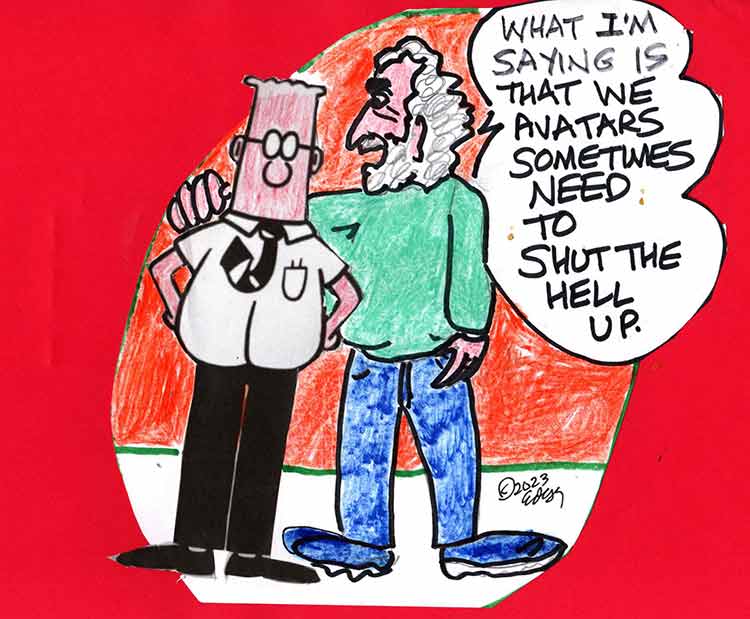The Dilbert Dilemma: No More Mister Not-Nice Guy
Why didn’t he just call his podcast “The Adams Anomaly”
By Ed Goldman
I hate to kick a multi-millionaire when he’s down but a number of you have emailed or texted wondering why I haven’t commented on the Scott Adams/Dilbert flap.
For those of you who missed it, Adams—creator of the syndicated workplace comic strip “Dilbert”—shot off both his mouth and his career from under his feet by making anti-Black comments on his podcast. The resultant uproar saw his strip canceled by almost every newspaper in the country (probably even some that didn’t carry it but like being swept up in a cultural moment). Indignant editorials followed and Adams seemed to double-down as they say at the craps table, and insult his critics rather than, say, go on talk shows and apologize, which is what true American sinners do.
Name those ‘toons
Okay, my comment about the stir: Since “Frankly, my dear, I don’t give a damn” has already been used, let me respond a tad more expansively.
First, a word about the “Dilbert” comic strip itself, which I rarely found all that funny, but not for the reason you might think. It was that Adams so perfectly copied the things about white-collar workplaces I’ve always considered claustrophobic, mind-numbing and generally odious that I found myself nodding rather than laughing at his observations. There were the clueless pointy-haired boss and intern; the irritable CEO and the do-nothing-at-all co-worker; the credit-hogging colleague; the evil HR dog; and even the vaguely former Soviet-bloc country wherein the never-revealed products of Dilbert’s company were assembled, between revolutions.
Second, and my real point, is I think that in most cases artists of all types should just let their work speak for them.
This is why I don’t do a podcast, despite a number of offers I’ve received to start one for this column. (They’ve come mainly from producers of podcasts hoping to charge me for writing and voicing my own work—not from a groundswell of hues and cries demanding I do one.)
But as someone wrote for Clint Eastwood to say in one of his “Dirty Harry” films, “A man’s got to know his limitations.” While I don’t have an especially unpleasant speaking voice (one of my infrequent side hustles is doing voiceover work), I write for the eye, not ear.
The rule isn’t absolute. I give a number of speeches each year and even go on a regional PBS TV show, Studio Sacramento, every December or January, to discuss my predictions for the year ahead. But it’s always in the same voice as my column: hoarsely bemused.
On that public affairs show I’m one of host Scott Syphax’s two guests; the other is Marcos Bretón. Marcos is a very gracious but very serious opinion editor for McClatchy newspapers. In the studio setting, I always figure my job is to simply amuse, in counterpoint to his trenchant observations. While I do have enough personal opinions to give a pollster a permanent earache, it seems that having one guy (Marcos) speak solemnly during a 30-minute program may be enough.
So my opening salvo in our most recent outing consisted of my mock-bemoaning the fact that at age 72, “I’m too young to run for President.”
I have to add that Marcos can nonetheless prove far funnier than I am—such as, during our most recent interview, his assessment of California Governor Gavin Newsom, whom he referred to as a guy making trips around the country to deny he wants to be its President, while temporarily settling into the role of being Joe Biden’s more charismatic attack dog. (You can see the show on YouTube)
Expressions abound these days about staying in one’s own lane or not attempting to discuss something outside our “wheelhouse” but the fact is, as writers, actors, painters and composers, we serve our opinions better by what we produce.
On a somewhat similar note, I never care what an artist says he or she “intended” in a painting or sculpture because I either like the work or don’t. I firmly subscribe to D.H. Lawrence’s maxim to “never trust the author, trust the tale.”
I also never watch the out-takes of a film immediately after seeing it because I don’t want to know how the director got me to be moved, angry or giddy. Peter Sellers always thought he missed getting the Best Actor Oscar for “Being There” because the studio idiotically ran out-takes over the closing credits in which he completely broke character. I’m very glad the actors all had a jolly old time making this dark satire about Chance the Gardener, a mentally damaged man whose simplistic utterances are interpreted as wisdom, but please—let me walk out of the theatre still appreciating the magic trick before you show me the doves or cards up your figurative sleeve.
I also don’t think most people care about the considered opinions of people who entertain them. This is why celebrity endorsements of politicians, causes or products can be dicey. Do we really think that Sean Penn knows more than us about anything except how to act in and direct movies? Do we really need advice about reverse mortgages from Tom Selleck—and do you think he actually has one?
Scott Adams seems to have imbued Scott Adams with political knowledge simply because he writes and draws a cute comic strip set in an office. He has every right to his opinions. His editors and syndicators have every reason to tell him to get lost and we have every right to consider his situation and say frankly, my dear, we don’t give a damn.
Ed Goldman's column appears almost every Monday, Wednesday and Friday. A former daily columnist for the Sacramento Business Journal, as well as monthly columnist for Sacramento Magazine and Comstock’s Business Magazine, he’s the author of five books, two plays and one musical (so far).













